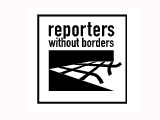|
|
TODAY.AZ / Politics
Reporters Without Borders: "Threat to retransmission of BBC, Voice of America and Radio Liberty/Radio Free Europe"
17 October 2006 [17:56] - TODAY.AZ

"This decision is targeted at international media whose independence the Azeri government seems to fear," the press freedom organisation said. "The National Council for Television and Radio is unfortunately under the control of the political authorities, who seem to want to limit the influence of western media, above all. The 13 October decision does not affect Russian stations (ORT and RTR) and Turkish ones (TRT and STV) that are less critical of the Azeri government."
The Azeri authorities say the media affected by the order do not have the required broadcasting licence. But article 14 of the radio and TV law states that a licence is only required if a media broadcasts all its programmes, which is not the case with these radio and TV stations. Each is only retransmitted for 30 to 45 minutes a day.
Firdevs Robinson, the editor of the BBC World Service's Central Asia and Caucasus Service told Reporters Without Borders that the BBC had been broadcasting in Azerbaijan since the mid-1990s and had never needed its own licence. "We respect Azeri law and we will try to meet our legal obligations," she said. "We hope the implementation of this decision will not result in our programmes being interrupted. If it does, it could be seen as another example of harassment of independent media in Azerbaijan."
Press freedom activists have also been harassed in recent weeks. Emin Husseynov, the head of the Institute for the Freedom and Safety of Reporters, who has been campaigning for imprisoned satirical journalist Sakit Zahidov, has been warned "not to be so active."
/www.rsf.org/
URL: http://www.today.az/news/politics/31559.html
 Print version
Print version
Connect with us. Get latest news and updates.
See Also
- 24 December 2025 [13:48]
Georgian Prime Minister makes phone call to President Ilham Aliyev - 24 December 2025 [13:25]
Serbian President makes phone call to President Ilham Aliyev - 24 December 2025 [12:42]
Vladimir Putin makes phone call to President Ilham Aliyev - 24 December 2025 [12:32]
President of Uzbekistan makes phone call to President Ilham Aliyev - 24 December 2025 [11:02]
President of Russia sends congratulatory letter to President Ilham Aliyev - 24 December 2025 [10:28]
Secretary General of Conference on Interaction and Confidence Building Measures in Asia congratulates President Ilham Aliyev - 23 December 2025 [15:49]
President Ilham Aliyev attends opening of office furniture and furniture fittings factory in Ballija village of Khojaly - 23 December 2025 [15:42]
President Ilham Aliyev attends opening of Khankendi-1 substation - 23 December 2025 [15:32]
President Ilham Aliyev attends inauguration of Faculty of Business and Economics building at Garabagh University - 23 December 2025 [15:08]
President Ilham Aliyev lays foundation stone for Engineering Faculty building of Garabagh University in Khankendi
Most Popular
 100 million is wasted: who pays for the fake history of the South Caucasus
100 million is wasted: who pays for the fake history of the South Caucasus
 New free trade accord reached between India and New Zealand
New free trade accord reached between India and New Zealand
 Opening of regional communications: equating to TRIPP
Opening of regional communications: equating to TRIPP
 "Garegin's days are numbered" is another reminder warning to the Armenian Catholicos
"Garegin's days are numbered" is another reminder warning to the Armenian Catholicos
 Azerbaijan’s FM honors Colombian Ambassador as he concludes mission
Azerbaijan’s FM honors Colombian Ambassador as he concludes mission
 Final statements delivered in trial of Armenian citizens at Baku Military Court
Final statements delivered in trial of Armenian citizens at Baku Military Court
 Presentation of 'Asaf Zeynalli Selected Works' held online from Australia
Presentation of 'Asaf Zeynalli Selected Works' held online from Australia
